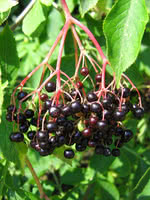Mon-Fri 9am - 5pm Mountain time
Black Elderberry vs Tango Weigela
Sambucus canadensis
Weigela florida Tango
NOT AVAILABLE THIS SEASON - MIGHT RETURN
CUSTOM GROW
Black Elderberry is a deciduous shrub native to eastern North America. You can plant this shrub in moist areas and it will help stabilize your soil. You can also use it on rural properties anywhere you'd use a lilac.
Black Elderberries are considered to be partially self-pollinating. So while they will still produce some berries without cross-pollination, planting with another variety will increase yields. Consider planting with Ranch Elderberry or Bob Gordon Elderberry.
Warning: the seeds, stems, leaves, roots, and uncooked berries of the Black Elderberry are poisonous to humans when eaten in quantity. You should cook the berries to make them safe for human consumption.
Tango Weigela is one of the smallest weigelas. Its compact form makes it ideal for urban yards or areas with limited space. The red, funnel shaped flowers with yellow throats are eye catching and fragrant. Good for borders, hedges, and foundation plantings, you'll love this new addition to your yard.
Black Elderberry Quick Facts
Tango Weigela Quick Facts
Toxicity: leaves, stems, and uncooked berries are poisonous to humans

